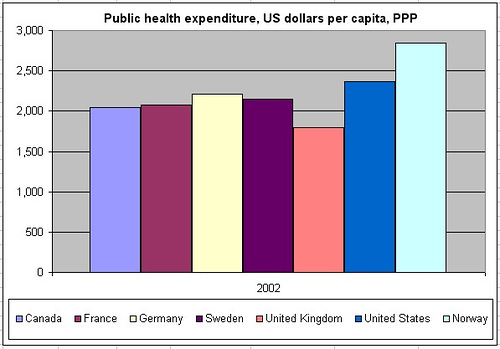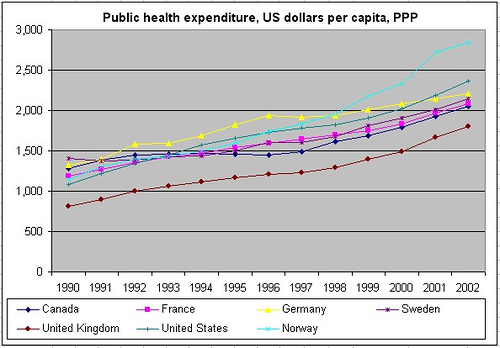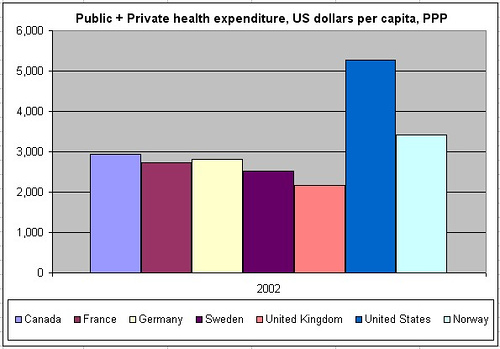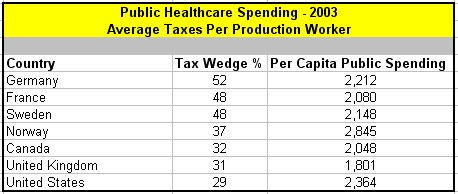European vs American Healthcare Spending
From the desk of George Adair on Mon, 2005-10-10 09:29
If one is to believe the self-created haze of the media when it comes to healthcare the Europeans are pampered from cradle to grave while the vast majority of US citizens are:
- Sick and dying
- Lacking health insurance (implying a lack of actual healthcare)
- Denied access to any form of healthcare
- Being carted to a hospital every 15 minutes
- One nanosecond away from a catastrophic health emergency at all times
In the ‘minds’ of many, all of these problems and more stem from the fact that public spending on healthcare is non-existant at any governmental-level in the US. A fringe group in Paris, the OECD, has a publication titled Factbook 2005. Factbook has a section regarding healthcare. How does the US stack-up against other industrialized nations when it comes to publicly funded healthcare? ‘Other’ industrialized nations who are reported to have perfect healthcare systems. Perfect in the mind of the left because the systems are largely government-controlled.
In 2002, how much public (ie. government) spending per capita on healthcare was there:

Source, OECD Factbook 2005.
Lest one think that 2002 is some sort of fluke Krugmanized year [Economist Paul Krugman has the habit of shaping, slicing and selectively citing numbers], a time series of public (ie. government) spending per capita on healthcare:

Source, OECD Factbook 2005.
The US also has the rather nasty habit of including private (ie. non-governmental) spending in the healthcare mix. What happens when private spending per capita is added to public spending per capita on healthcare in 2002:

Source, OECD Factbook 2005.
Oh you say, the problem in the US is not public spending on healthcare but paying healthcare insurance premiums. Citizens in government-controlled healthcare systems don’t have to pay these healthcare insurance premiums, they get healthcare for ‘free’. However, citizens under the ‘free’ government-controlled system have premiums to pay as well, these premiums are called ‘taxes’:

Source, OECD Taxing Wages 2002-2003.
Of course the information above does not fit the end-of-the-world template of many on the left. But my goodness, if the information was the other way around ...“lowest per capita spending on healthcare of any industrialized nation” would be ringing throughout the newsrooms coast-to-coast on both sides of the Atlantic.
Just some information to remember the next time any media outlet decides to run a “Dead and Dying in America” type of series.

Your health insurance
Submitted by jackie on Thu, 2008-10-02 01:10.
Your health insurance policy lists a package of medical benefits such as tests, drugs and treatment services. The health insurance company agrees to cover the cost of certain benefits listed in your policy. It is always free to get health insurance quote.
European vs. American Healthcare Spending
Submitted by BadFrog (not verified) on Tue, 2005-11-22 19:44.
This is a case of someone throwing a stone from a glass house. If someone is selectively citing information, it is the author of this piece as shown below.
(1)What the author doesn't say is that the so called tax "wedge" number shown is based on taxes for singles without children. Now, in many European countries, the taxable income is inversely proportional to the number of family members, pushing it down into much lower brackets. This advantage to families is much more effective than the US system that offers only a nominal reduction per family member. This is actually illustrated in one of charts of the OECD report that shows numbers of married couples with two children -- carefully ignored by the author.
(2) More generally, critics of the US healthcare system are generally not complaining that the US is not spending enough. What is criticized is the inefficiency and the unfairness of the system. 44 million uninsured people in a country that spends more than any other one! Other performance data confirm that the system is flawed. US taxpayers are paying top dollars for a system that leaves large segments of the population aside, and is unable to improve the health level of the population and bring it close to other developed countries. I wish the author would have addressed the subject in a less selective manner.
The best book I've seen on
Submitted by Anonymous (not verified) on Thu, 2005-10-13 17:03.
The best book I've seen on the subject is this:
Lives at Risk: Single-Payer National Health Insurance Around the World (Paperback)
by John C. Goodman, Gerald L. Musgrave, Devon M. Herrick
List Price: $22.95
# Publisher: Rowman & Littlefield Publishers (July, 2004)
# Language: English
# ISBN: 0742541525
As an example, use infant mortality rates. You would think it would be easy to compare such things. In fact, in the USA, if it came out of a female's uterus, it has a pulse and breathes, it's a live birth and counted as such. If it's extremely premature and doesn't have a chance at life, it becomes an infant mortality.
In some other countries, if the infant is below a certain gestational age or size, even if it's crying, it's counted as a miscarriage and not counted as an infant mortality when it dies.
Check out this book. The authors do an admirable job deconstructing myths regarding single-payer medical systems.
Healthcare Spending & Healthcare Effectiveness
Submitted by Johan Van Loon (not verified) on Tue, 2005-10-11 11:08.
This is a very commendable article but I would very much like to see a follow up.
How does the USA compare to other industrialized nations in healthcare effectiveness ? Average life span, child deaths,.... and when you make a matrix of spending & effectiveness which system is the most efficient one ?
I wouldn't be surprised if the United States would rank much higher than expected by the European Mainstream Media.
Wouldn't that be interesting material ?
Healthcare spending and effectiveness
Submitted by BadFrog (not verified) on Tue, 2005-11-22 22:11.
Sorry to disappoint you. Just review the reports and statistics from the World Health Organization (also check the last in-depth study of healthcare systems in world: http://www.who.int/whr/2000/en/index.html)
The US ranks lower than most developed countries in overall health system performance. The US total spending is higher than any other country, and, on many metrics, ranks lower than most European countries.
The question isn't if the US
Submitted by Chris (not verified) on Mon, 2005-10-10 18:13.
The question isn't IF the US has good healthcare, but instead how it is that the US government can spend MORE money and still not provide healthcare to everyone.
This article points to the true benefit of a national healthcare system: Lower Costs. Just like a big health insurance company is able to provide better rates than a small one, a nationwide healthcare system can get the best rates of all! The social benefit of universal coverage is just a side-effect. Another benefit is fewer problems with legal liability issues and less money spent on "I slipped on a puddle in your store so I'm going to sue you".
I'm an American currently living in Europe, so I'm aware of all the horror stories about waiting months just to see a doctor, but I could continue to use private insurance, go to a private practice and still pay less money than I do in the US today.
Slightly off-base
Submitted by Flemish American (not verified) on Tue, 2005-10-11 20:17.
The figures quoted in this article are meant to demonstrate that the U.S. system is not as bad as the local media portrays it. It is not necessarily implying that one system is better.
I have 15 years under my belt and admit that I am used to the Belgian way. However, I cannot deny that the U.S. has some of the most superior facilities in the world. We were on vacation in Louisville, Kentucky and my daughter got sick. We took her to a local hospital that was touted by my sister as one of the top children's hospitals in the world. I was amazed at how she was cared for compared to the generally indifferent care seen in many European facilities. She was diagnosed correctly and was back on her feet within a day or two.
I also know that healthcare is not actually denied to people in the U.S. although the media would have us to believe that. Your points are not wrong, but they are guilty of twisting the facts just as the local media does to portray the U.S. as being inferior. This is what irks the writer and irks me too.
Fact is, their point about taxes being significantly higher to pay for the system are right on. It is impossible to compare wages with our equals in the U.S. because, although they take more home, they also have to pay more out. In Belgium and in most European countries, what you take home is mainly for you. Socialism is probably more realistic as it takes for granted that people are too ignorant to take care of themselves.
Nonetheless, I have two mentally handicapped kids and am thankful every day that I am in Belgium where getting proper care for them does not require a second mortgage. I do not dissagree with your comments, but I dissagree with their presentation as the wording is designed to portray the same negativity expats are fighting here everyday.
US Healthcare
Submitted by Molly (not verified) on Mon, 2005-10-10 13:04.
The European media who continue to write disinformation about America should be ashamed. They have to know that they are writing and publishing lies. The facts are out there for anyone to find, but only if they want the truth. In the 2 years that I have been living in Belgium, it is obvious that the journalists (??????) would rather write half-truths or outright lies in order to satisfy their own agenda.
Let me tell you about healthcare in the States. I worked for many years in a federal and state capacity and the healthcare was paid for by those agencies. If you work, almost all companies offer various kinds of health insurance. For the elderly and families of low income, there is government-paid medical insurance available. Of course there are always those who are too lazy to work. I have no pity for them.
I dare one of these so-called journalists to come to America and visit the Texas Medical Center, only one of the type of facilities in the States. The US has some of the best heart, cancer and children's hospitals in the world. And, maybe this is why so many from around the world come to America for medical treatment. Medical care which is available for anyone and everyone.
http://www.tmc.edu/
Not so smart.
Submitted by Jason M. L (not verified) on Tue, 2005-11-29 07:58.
Some people go to school fulltime, and work part time. Some peoples life situations disallow them to fall into nice paying jobs with health insurance. For those that want jobs with insurance, you must have a degree. To obtain that, you must of course go to school, and not work fulltime. People who make a low income are not actually covered by medicare/medicaid under MANY different circumstances. That is, many kids who are 18-20's who are not qualified since they are not seniors, or children. This is a terrible healthcare system here. Of course it is not for those who have salaries over 40,000 dollars, but thats not too common for many americans who barely make 17,000 a year. They are the ones who are hurt by not being able afford insurance,or medical bills. And now, we all know with military spending gone out the roof, that this problem could easily cease. That is, if you have the mental capacity to realize our recent war/wars are and have been ignorant.
Care for the poor and elderly
Submitted by Bob Doney on Tue, 2005-10-11 09:48.
For the elderly and families of low income, there is government-paid medical insurance available.
Hi, Molly! We are always being told that the USA is a winner-takes-all and uncaring society. From your experience of living in both the USA and Belgium, how does the medical care of the elderly and poor compare between the two countries?
Bob Doney